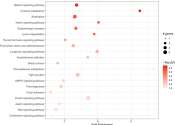Scientists discover potential biomarkers of environmental exposures in Parkinson's disease
A team of Northwestern Medicine investigators has discovered novel DNA methylation patterns in the blood of patients with Parkinson's disease, according to findings published in Annals of Neurology.
22 hours ago
0
46









